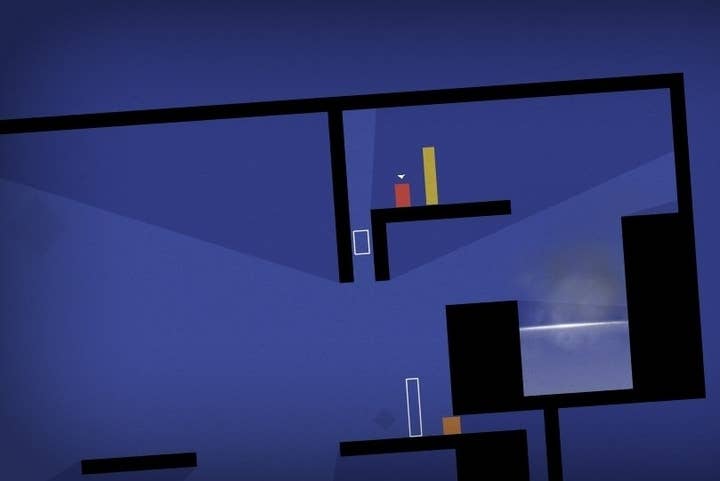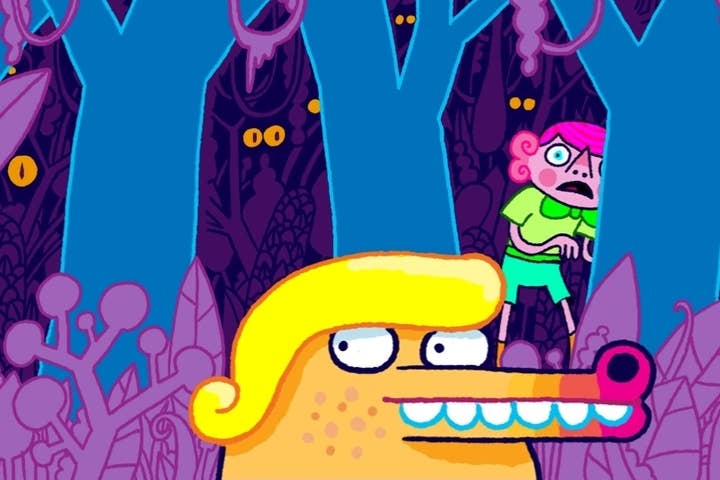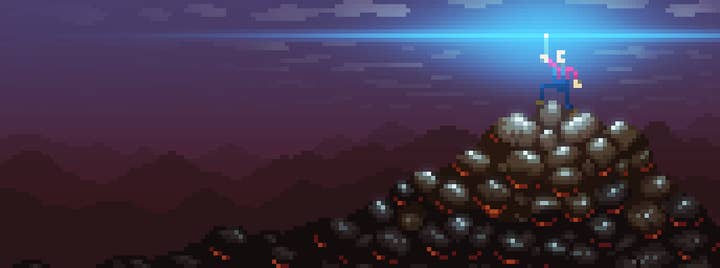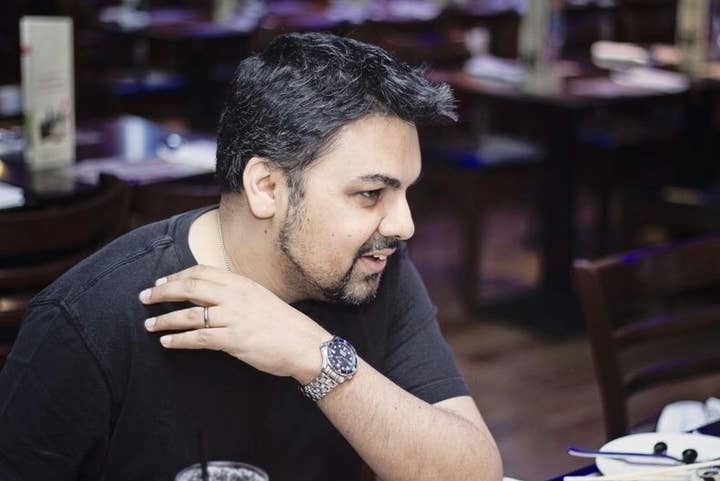Sony: "We're seeing the birth of a new wave of next-gen developers"
How Shahid Ahmad's PlayStation indie programme is working with all the next big things
If you're not an independent developer there's a chance you might not have heard the name Shahid Ahmad until he took the stage at this year's Sony Gamescom press conference. He admits his appearance was a bit last minute, a bit unexpected, but it shouldn't have been. As senior business development manager at Sony Computer Entertainment Europe he's in charge of strategic content for all the Sony platforms.
And how's he doing? Well he's signed games like Thomas Was Alone, Hotline Miami, Luftrausers, Velocity Ultra, Lone Survivor, Spelunky, Terraria, FEZ, Volume, Football Manager Classic '14 and is the man indies should speak to if they want to see their game on PlayStation formats. In a boardroom at Sony HQ the softly spoken exec explained how after 30 years in the business, he's found the best job in games.
The interesting thing is that it's the indies who are leading the indie charge. It's certainly very exciting to be involved with so many of them, and it's a position that can easily change for any platform holder or any publisher for that matter. You have to keep working at it.
It's a position that we respect. It has only come about as a result of us respecting our partners, many of whom now are independent developers.
"Vita does seem like a natural habitat for indie developers. It is an incredibly versatile device"
About a year ago, shortly after I took on the challenge of bringing games to Vita, it seemed like a difficult challenge. But it does seem like a natural habitat for indie developers. It is an incredibly versatile device. That screen is amazing. It kind of suits that intimate experience. A lot of indies are making very intimate experiences and completely new types of game.
I think one of the interesting things for me was that if you weren't going to necessarily get games first on Vita that when they appeared on Vita they were going to be best on Vita. And more and more people - not just me [laughs] - thankfully are coming to that conclusion, and that's really gratifying.
It's fulfilling the ambitions of a lot of independent developers and I'm really excited about that. I think everyone at PlayStation is excited about that.
There are quite a few developers who are quite happy to stay with Vita and not see it just as an entry point. But obviously people are going to be excited about PlayStation 4 - who isn't? It's generated a lot of excitement across the whole industry, not just with independent developers. But I think there's a sense with a lot of independent developers that they have more access - or not so much more access but a sense of more openness - from PlayStation, and the very idea that they can develop for PlayStation 4 is very exciting for them.

And for us it's not news, you know. Mark Cerny said over and over again that it was developers that helped to shape the design of the PlayStation 4, and of course a lot of the indies that we're working with came from a AAA background as well. So they're not all brand new developers.
Traditionally we've been very much a B2B type company when it comes to developers and publishers. The reason for that is PlayStation 2 was huge and we needed to find systems and processes that would help us to work with as many partners as possible, while also keeping the quality levels up.
With indies it's much more a case of the onus of quality, and the onus of creating a really good experience is on them. They take that responsibility very, very seriously. So there are two things: first of all we have to make the process easier for them - we've done that and we're continuing to do that.
A lot of these people absolutely love PlayStation. For them it's a dream to be on PlayStation and that kind of takes us by surprise as well, because that's not a typical B2B-type behaviour. It's very much an individual and a fan-type behaviour, so the interesting thing that you've got going on here is a fan of PlayStation on one side of the table, another fan of PlayStation on the other side of the table.
That's new and it's very exciting, but the thing is some of those legacy processes still remain so our job is to try and make navigating those processes as easy as possible for the developers we're working with. They're not used to that level of process.
Very much a case of being on call but also of giving them as much help as we can. We've got excellent facilities that not a lot of people know about. We've got a developer relations team that are constantly available to help with basic account management issues, and then we have R&D who help with engineering issues and technical issues. All of that stuff is free once you're with PlayStation. Not a lot of people are aware of that.
But us too, in the biz dev side, being available on Skype, being available on email, being available on the phone or in person, that's really really important. It's all about the relationships now.
There is no typical working day. I wish there was. Because we're working with so many partners they keep things very, very interesting for us. Lots of discussion with developers on all kinds of social media. I think we're most visible on Twitter, but there's also a lot that goes on behind the scenes on Skype and email and on the phone.
"Our job is to try and make navigating those legacy processes as easy as possible for the developers"
Then the team is obviously working on production issues for games that are actually being developed, helping developers with new things... The great thing about working with so many new partners is that they've all got different things that they want to bring to the table, so every situation is unique.
So it's navigating through the complexities of creating a full-blown console title and helping the developer do that, the team is heavily involved in that kind of thing as well. Meetings, going to events, talking about new projects, scouring the world for new developers and for existing developers working on new things. There's never a typical day.
There was a lot more direct prospecting, if you like, over a year ago. I think it's a bit more indirect now, because you get so much through social media, referrals, people vouching for other people or other ideas. If you want to call it a community, the indie community is very, very well connected. The great thing is about a year, a year and a half ago, we weren't working with so many of them, and now we're working with most of them.
There's definitely a case of if Mike [Bithell] comes to us and says, 'listen, I think this is fantastic,' and we already have it on our list - or even if we haven't, and there are other people saying, 'this is fantastic, these guys really know how to make great games and this is one to watch out for'. That is going to accelerate our interest.
It's really important to realise that the indies we're working with don't act as gatekeepers, but if we're looking at a title and someone we're working with and we trust says it's definitely worth looking at, of course that's going to make it a bit more interesting to us.
I think showing a lot of respect is very important. I think not reading too much into 140 characters is also important. It's very easy to jump on something and to have a take in 140 characters of text that might get you into trouble. It's much easier just to ask a follow-up question. Just to be really, really careful not to knee-jerk react to stuff and to follow-up and be considerate and respectful of other people.

I wasn't always like that, but as things got more engaging at PlayStation you have to be more careful. I think we've just about managed to get that balance right.
It's all on the public timeline, and that's one of the ways we've been quite different, I think. Just how much more open we've been in the public eye. It's easier to do that when the direction the company is taking is in alignment with how you're interacting with people publicly.
So internally as well there's a drive towards the stuff that's being talked about externally. There's a congruence about PlayStation at the moment. It's not just me. Look at Yoshida-San, for example - he's amazing. What a figurehead, and this was inconceivable a few years back.
I think there's just been this really great congruence, where the whole company has been becoming a bit more open. I say a bit more open because we weren't actually as closed as people think we were before. But the important thing is we're talking more about it and we're backing up our talk with action. It is a double-edged sword. There will be times when things are picked up negatively by people, and that's a cause of heart attacks for the PR manager at times, but it hasn't happened too often, thankfully. The best thing to do in that situation is if people have got questions they'll ask you and you can give them a clarification, but if not you've just got to leave it, because people are going to make what they will of what you say.
So there is that double-edged sword, but on the upside it does mean that PlayStation gets a lot more attention, a lot more affection than before, because of the openness. I think it's a price worth paying.
Most of the best guys are better than I'll ever be. They grew up in this space, so to them it's as natural as breathing. I'm an old guy, I had to kind of get used to it. Take the likes of Rami [Ismail] from Vlambeer. The guy is an absolute professional. You wouldn't think for a minute that he's half my age - it makes me sick. [laughs] But he was literally born to do marketing for Vlambeer, and he's incredibly measured, incredibly controlled.
Sometimes you see what someone is saying and and you think, 'oh god, I wish you hadn't said that', but you're not going to stop them because it's part and parcel of learning how to become better at something. We don't control them. I guess the motto you've heard us use over and over again is support, steer, don't interfere. And certainly you're not going to interfere in the way they run their marketing. We'll support them, so for example with a lot of the games that are coming out through the store we've got them banner support and we've got blog posts up and that sort of thing.
Interfering would be trying to get them to say something they don't want to say, and we'd never do that.
It was such a long time ago I guess I was indie before there was such a thing as an indie. We were called bedroom programmers, which is obviously not as cool as being called an indie. I wish that tag had been around then.
I think it does help, on balance. And I think it helps because you've got more of an all-round perspective on their challenges, and occasionally there comes a time when you can answer a question or support them in a way that you wouldn't have been able to do without that knowledge.
I've called it a Cambrian explosion. That's exactly what it is because it's way bigger, in my opinion. I don't think everyone agrees with that, but I think it's way bigger than it was in the beginning. Yes it was brand new in the early 80s, late 70s, but now it's just enormous - it has come to mainstream attention.
"Right now I think what we're seeing is the birth of a new wave of next generation developers"
I don't see a divide. I see a continuum of one person creating a game and an enormous corporation creating a game. They're just games. The tag is useful because I think it kind of bundles up a revolution that's happened over the last few years, and the revolution has, I guess, three main legs. You've got digital distribution, you've got games everywhere and you've got better tools, and all of that has facilitated this explosion in the number of developers. I think it's allowed more people to make games than ever before, and some of them are going to move on and do bigger things. They're going to work with larger teams to do bigger things, and of course some of those teams will get bigger and bigger.
So right now I think what we're seeing is the birth of a new wave of next generation developers. Some of them will stay small, and I'm really pleased that we're helping evolve PlayStation to a point where we're as accommodating to the smallest developers as we are the largest. And the thing is we've done this in the past, so for example Minis was really, really good for smaller developers. PlayStation Mobile has also helped in some respects as well. And going back into the distant mists of time you've got Parappa The Rapper, Ico, Super Stardust HD. We've always dealt with this level of developer, it just wasn't always as easy as we've made it [now], and we're going to make it easier and easier.
So yes, hopefully in a few years time no one will be talking about indie in relation to games. They'll just be talking about games, and it will be just as valid to have made something coming from a small developer as from a large.
It's a role I could only have dreamed of. It's probably the greatest job in video games today. I don't think anyone could have a more exciting position. I think the first 30 years of my career were preparation for this last year and a half.
Yes, the company has recognised the shift in landscape, but we've always done that, we've always responded. The way we dealt with publishers in the PS2 era was a response to the environment we had at the time, a response to our dominant position and with digital distribution. We were dealing with small developers back in 2007 as well, publishing games on the PS3 on the PlayStation Network by two-person teams.
It's just become so prevalent now. It's not just a few professionals with extremely high levels of technological skill that can do this. You don't have such a high barrier to entry from the technology side. Just about anyone can make games now.

That's outside of my work at Sony, but I guess the goal is to show youngsters that, no matter how bad bullying gets for them that there are a bunch of people out there that overcame bullying and are enjoying a quality of life they never expected to enjoy.
One of the things that's very difficult for someone being bullied as a youngster to accept is that life can get better. There's this unbearable blackness and a sense that it's never going to end, it's never going to get better. So the goal of Beyond The Final Boss was to gather a bunch of individuals from every part of the games industry who'd experienced bullying when they were younger, and for them to describe how much better life is for them [now]. That they're enjoying a life experience that their younger self could never have imagined was possible, and in doing so give them hope.
And it was set up because I noticed a discussion on Twitter between my friends Byron Atkinson Jones [director of Xiotex Studios Ltd] and Mike Bithell, who were talking about bullying and how they'd wished that they had been able to address their younger selves in some way, and I thought this needs to be done now.
So I immediately got the ball rolling and set the whole thing up. There's no money involved, it's just a website where we feature a load of profiles from people who were bullied, who are involved in games in some way and whose lives are just way better now. Our only goal is to get these profiles out to as many youngsters as possible and that's it. We don't ask for donations, there's no official charity set up, it's just a website and the only goal is to get some hope out there to some of these youngsters who otherwise don't have that.

